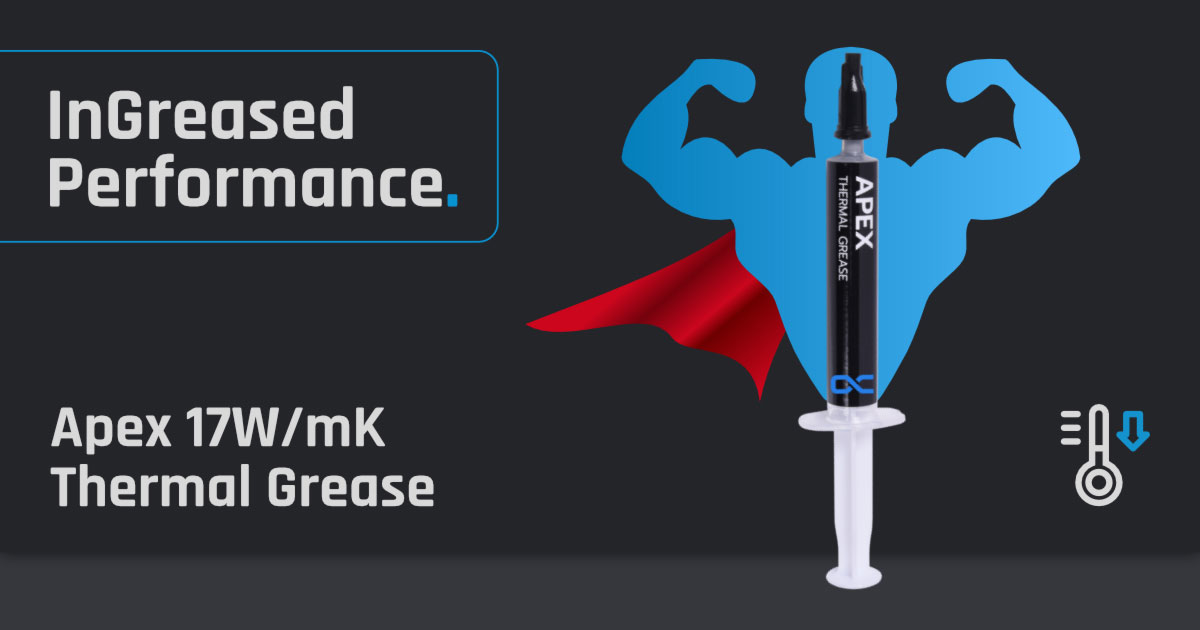NZXT Enters Thermal Paste Market Touting High Performance and 6.3 W/Mk
Meanwhile, Alphacool's new Apex paste claims 17 W/Mk
PC components stalwarts NZXT and Alphacool have launched new thermal pastes. NZXT's new paste — its first-ever thermal paste — is dull-but-descriptively named NZXT High-performance Thermal Paste ($9.99/3g, $19.99/15g). Alphacool claims its new thermal paste, called Alphacool Apex Thermal Paste (€14.99/4g), is the best non-liquid metal thermal paste. Both thermal pastes are electrically non-conductive and are touted as easy to apply, with long-term stability.
The thermal compound that you put between your CPU and cooler (or in re-pasting your GPU, or laptop) can make a significant difference to cooling performance, so it's worth considering carefully when you build or maintain a PC. We tested over 90 different pastes (thermal and non — we even tested toothpaste) in our exhaustive round-up of the best thermal pastes, published earlier today. However, NZXT and Alphacool's new products have somewhat spoiled the comprehensiveness of our coverage — we'll have to test them once we get our hands on them.
Over recent years there have been some esoteric pastes made with materials such as diamond and liquid metal (which can be hazardous due to electrical conductivity and chemical reactions with aluminum). These new pastes from NZXT and Alphacool are more traditional: non-electrically conductive, non-corrosive, and easy to apply and clean off.
For a better handle on the new thermal pastes and how they compare, take a look at the specs.
|
Specification |
NZXT HPTP |
Alphacool Apex |
|---|---|---|
|
Thermal conductivity |
6.3 W/mk |
17 W/mk |
|
Density (g/cc) |
3.5 |
3.5 |
|
Viscosity (mPa.s) |
35~220x103 |
35~220x103 |
|
Color |
gray |
gray |
|
Lifespan |
3 years shelf life |
Not stated |
|
Quantity |
15g, 3g |
4g |
|
Price |
$19.99, $9.99 | €14.99 ($15.88) |
The new Alphacool Apex thermal paste has a much higher claimed thermal conductivity value, and its marketing material asserts it is "one of the best performing thermal pastes on the market," which is only beaten by liquid metal alternatives. Meanwhile, the slightly cheaper (much cheaper if you buy it in bulk) NZXT High-performance Thermal Paste has thermal conductivity on a par with PC-builder-favorite Arctic MX-5 — so its performance is by no means poor.
NZXT says its paste uses zinc oxide, liquid polymer, and aluminum material. Alphacool isn't as forthcoming with its ingredients, and instead says that its thermal paste is formulated using "a nano-powder with a very low thermal impedance." So, it looks like Alphacool's new paste relies on nanotechnology-boosted thermal conductance.
If you're not sold on NZXT's first foray into the market or Alphacool's nanotech-infused secret sauce, we suggest going for one of the picks in our best thermal pastes round-up (not toothpaste).
Get Tom's Hardware's best news and in-depth reviews, straight to your inbox.

Mark Tyson is a news editor at Tom's Hardware. He enjoys covering the full breadth of PC tech; from business and semiconductor design to products approaching the edge of reason.
-
Phaaze88 More necessary(?) options... the most important factors IMO, are viscosity(cpu/gpu applications) and price per gram.Reply
An older TH article about thermal paste performance here. 'Huge' difference between the best and worst reputable brands... -
Alvar "Miles" Udell The "problem" is that you can get Arctic MX-5 for about $9, MX-4 for about $6, and Silver 5 for about $5. All three of those I'd consider a base standard for a TIM. They're not electrically conductive, high quality, high performance, viscous enough to use on both CPUs and GPUs, and inexpensive. When the thermal difference is measured in less than 5°C, it'd be difficult for me to recommend paying 50%, or more, more.Reply

